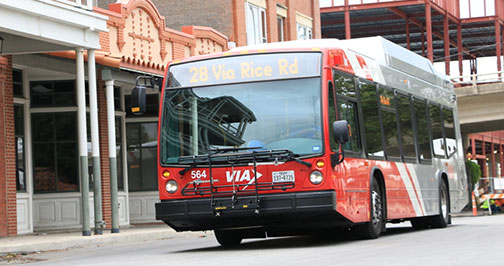Posted on September 8, 2023 by Amanda Cerreto

In UTSA’s Department of Public Administration, students have the benefit of learning from instructors with real-world, on-the-ground experience. Every semester, several city officials, nonprofit managers, and other executives teach courses for the program’s undergraduate and graduate population.
 John Tiemann, AICP, is one such instructor, lending his expertise to MPA students this past summer and fall. Tiemann serves as a Strategic Initiatives Manager with VIA Metropolitan Transit. As a bonus, he is a graduate of the MPA program, so he knows firsthand what it’s like for working professionals earning an advanced degree.
John Tiemann, AICP, is one such instructor, lending his expertise to MPA students this past summer and fall. Tiemann serves as a Strategic Initiatives Manager with VIA Metropolitan Transit. As a bonus, he is a graduate of the MPA program, so he knows firsthand what it’s like for working professionals earning an advanced degree.
“I’ve really enjoyed having the opportunity to come back into a role where I can not only engage the community through my professional life at VIA, but also to pivot and share the lived experience I’ve had so students can be more mindful of the opportunities that are out there,” Tiemann said.
At VIA, Tiemann’s current primary focus is on the Keep San Antonio Moving plan. Its goal is to move people faster and farther by improving traditional bus service, expanding mobility options, and investing in capital and technology to provide a better customer experience. Tiemann ensures that the program’s messaging and activities represent the needs and wants of the community.
The other item taking up most of Tiemann’s days is Advanced Rapid Transit. “This is the first of its kind for our region – transit vehicles in dedicated lanes on key corridors, that can deliver service more efficiently and reliably for customers.” The VIA Rapid Green Line is the first Advanced Rapid Transit service that will provide 10-minute service on weekdays and 15-minute service on weekends.
Tiemann’s breadth of experience is something that often does not immediately come to mind for those pursuing an MPA.
“I think when students think of public administration, they see nonprofits and organizational leadership,” he said. “I took a very interesting route in and focused more on transportation planning, public policy, and public engagement, as well as working for elected officials.”
This summer, Tiemann taught Urban and Regional Economic Development, using his real-world experience to illustrate the concepts students learned. “They can see, in real terms, how this knowledge applies to the day-to-day that we're in right now,” he said. “That has been very rewarding.”
In this class, students studied the importance of autonomous and connected driving systems, the prevalence of artificial intelligence in the workforce, freight mobility, and how it applies to informing urban and regional economic development in Texas. Leveraging Tiemann’s planning expertise, the class looked at different land use-related patterns and catalysts for development.
“Land use planning as part of the curriculum for public administrators is different than that of urban and regional planning,” Tiemann explained. “It’s meaningful for planners to understand population growth and trends so that they can ensure that infrastructure dollars are allocated to support that growth.”
This fall, Tiemann is teaching Introduction to Urban Management Policy, where students will dive into urban management's intricate challenges and solutions. The curriculum aims to sharpen their theoretical grasp and hands-on application of urban policies by including lectures, case studies, and robust class discussions. Tiemann explains, "The goal is to nurture a keen analytical mindset where students not only understand the core factors molding urban governance but also explore practical management strategies and dissect real-world cases." This comprehensive approach ensures they hone essential skills such as critical thinking and effective communication, vital for confronting urban management quandaries.
Another bonus students received was a direct line to a recent piece of legislation that Tiemann worked on as a consultant: Senate Bill 1308. This bill called for a study on the potential benefits and impacts of autonomous and connected vehicles for the state of Texas.
Tiemann walked the class through the study and all its components and considerations. “We asked, what does it look like for autonomous vehicles at border crossings? What does it mean for public safety and the workforce?” he said. “We already have these companies leveraging autonomous and connected driving systems on our roads today for freight vehicles, and we want to make sure that we're ready.”
Through different exercises, students would focus on these topics and both the hypothetical and very real scenarios and their ripple effects. “I think this helped them realize that there's nothing that's truly incremental in policy change,” he said. “If you’re going to bring about any change, you have to have the right stakeholders and be robust in your community engagement.”
Tiemann encourages all students to keep an open mind when earning an MPA, knowing the variety of career opportunities and chances for changemakers that exist in the field. “One of the beauties of transportation is that it’s the literal sense of connecting people to opportunity,” he said. “You can’t physically get connected to opportunity without reliable transit and mobility options. It’s a great reason why I show up every day.”

